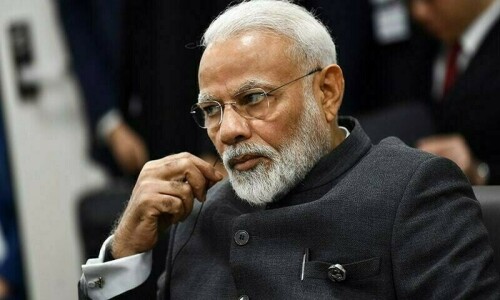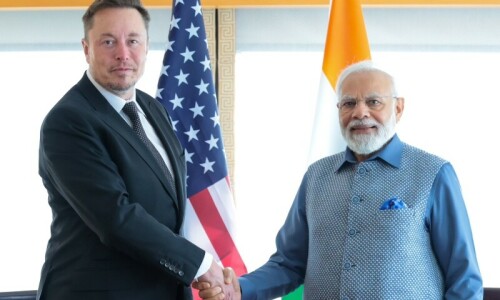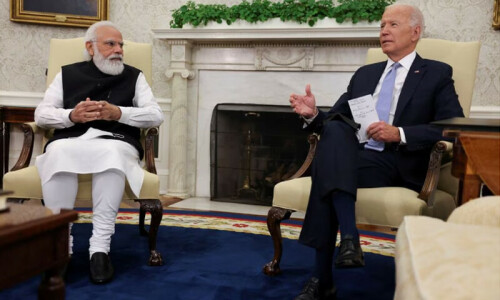
WASHINGTON: Even though US President Joe Biden said the relationship with India “would define the next century”, he made a faint reference to the human rights situation under Prime Minister Narendra Modi.
Addressing a press conference after their meeting at the White House on Thursday, Mr Biden called religious pluralism a “core principle” for both India and the US and said democratic values “face challenges around the world and in each of our countries”.
The Indian prime minister defended his record and criticised those who questioned India’s democratic character. “Regardless of caste, creed, religion, gender, there’s absolutely no space for discrimination.”
The US president has been under pressure from activists and the Democratic Party’s progressive lawmakers who urged him to publicly raise the issue of human rights in India.
Indian PM says ‘no space for discrimination’ in his country; joint statement calls on Pakistan to act against militants who target New Delhi
However, other than a few remarks about the rights situation, the press conference was otherwise dominated by the exaltation of India-US ties.
“The challenges and opportunities facing the world in this century require that India and the US work and lead together,” Mr Biden said.
The Indian PM said his visit brought a “new direction and new energy” to the “global strategic partnership” with the US.
He also addressed the Ukraine war, saying that he was “completely ready” to broker peace in Ukraine, although he stopped short of promising any break with Russia.
As the US president hosted Mr Modi, protesters outside reminded them that the Indian government espoused a far-right Hindu extremist ideology which has created a hostile environment for the country’s minorities, especially Muslims.
Trucks with banners urging President Biden to question India’s human rights record drove around New York this week.
The only two Muslim women members of the US Congress — Ilhan Omar and Rashida Tlaib — along with Alexandria Ocasio-Cortez, separately said they will boycott Modi’s address to Congress on Thursday, citing allegations of abuse of Indian dissidents and minorities, especially Muslims.
Flurry of agreements
A flurry of new deals were also announced on Thursday, with General Electric saying it has signed an agreement with India’s state-owned Hindustan Aeronautics Ltd to make fighter jet engines for the Indian Air Force.
Memory chip firm Micron Technology also said it would invest up to $825 million in a new chip assembly and test facility in Gujarat, India, its first factory in the country.
Meanwhile, two other deals that would allow India to purchase 30 MQ-9B ‘Reaper’ and 31 high-altitude long-endurance drones were also unveiled. Made by General Atomics, the order is worth slightly over $3 billion.
India also agreed to join the US-led Artemis Accords on space exploration and to work with NASA on a joint mission to the International Space Station in 2024.
Statement against Pakistan
In an apparent bid to use the visit to further India’s agenda against Islamabad, a joint statement issued by the two heads of state late on Thursday also called on Pakistan to crack down on extremists that target New Delhi, AFP reported.
The statement called for action against extremist groups based in Pakistan such as the banned Lashkar-e-Taiba and Jaish-e-Mohammad.
“[The two leaders] strongly condemned cross-border terrorism, the use of terrorist proxies and called on Pakistan to take immediate action to ensure that no territory under its control is used for launching terrorist attacks,” the statement said.
The statement also called on Pakistan to punish perpetrators of attacks, including the 2008 Mumbai attacks.
Earlier in the day, the Biden administration had assured Islamabad that Washington still wanted a stable and prosperous Pakistan.
“A stable, secure, and prosperous Pakistan, is not just in the interests of the region but it’s in the interests of the United States as well,” said State Department spokesperson Vedant Patel when asked about possible US support for Pakistan’s efforts to revive an IMF aid package.
“We engage regularly with Pakistani officials, and you’ve heard me say this before… Our engagement is critical to our ultimate goal, which is a stable, secure, and prosperous Pakistan,” said Mr Patel when asked about a meeting between the Pakistani finance minister and the US ambassador in Islamabad.
Published in Dawn, June 23rd, 2023











































